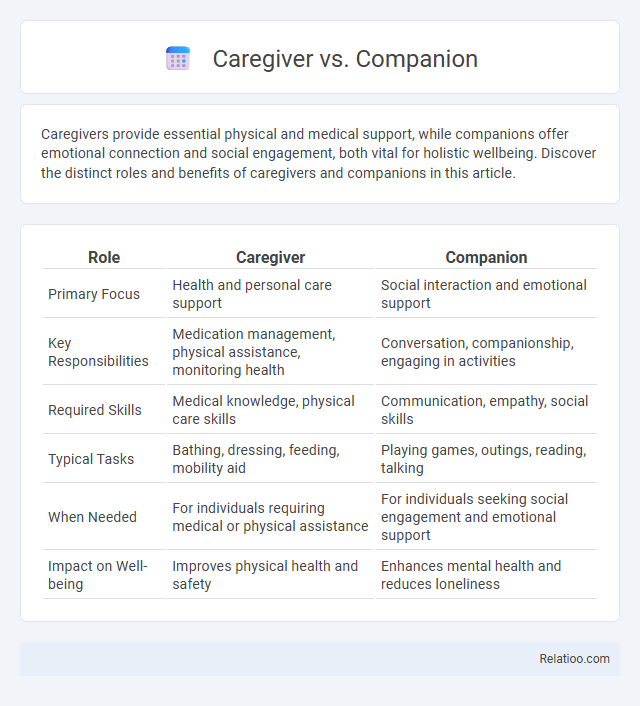Caregivers provide essential physical and medical support, while companions offer emotional connection and social engagement, both vital for holistic wellbeing. Discover the distinct roles and benefits of caregivers and companions in this article.
Table of Comparison
| Role | Caregiver | Companion |
|---|---|---|
| Primary Focus | Health and personal care support | Social interaction and emotional support |
| Key Responsibilities | Medication management, physical assistance, monitoring health | Conversation, companionship, engaging in activities |
| Required Skills | Medical knowledge, physical care skills | Communication, empathy, social skills |
| Typical Tasks | Bathing, dressing, feeding, mobility aid | Playing games, outings, reading, talking |
| When Needed | For individuals requiring medical or physical assistance | For individuals seeking social engagement and emotional support |
| Impact on Well-being | Improves physical health and safety | Enhances mental health and reduces loneliness |
Understanding the Roles: Caregiver vs Companion
Understanding the roles of caregiver vs companion highlights key differences in support and responsibilities; caregivers provide medical assistance, personal care, and help with daily living activities, while companions focus on social interaction, emotional support, and companionship. Your choice depends on the level of care needed, with caregivers often requiring specialized training to manage health-related tasks. Companions enhance quality of life by preventing loneliness and promoting mental well-being without managing medical needs.
Key Differences Between Caregivers and Companions
Caregivers provide essential medical and personal care, including medication management, hygiene assistance, and mobility support, tailored to individuals with health challenges. Companions primarily offer social interaction, emotional support, and assistance with non-medical tasks like meal preparation and errands. The key differences lie in the caregivers' clinical responsibilities versus companions' focus on enhancing quality of life through companionship and basic help.
Duties and Responsibilities of a Caregiver
Caregivers provide comprehensive support including medical assistance, personal hygiene help, medication management, and monitoring of health conditions, ensuring your well-being and safety daily. Companions primarily offer emotional support and social interaction without handling medical or physical care tasks. The key distinction lies in caregivers' professional duties addressing complex health needs versus companions' role in enhancing social engagement and companionship.
Primary Functions of a Companion
A companion primarily provides emotional support, social interaction, and non-medical assistance to enhance the well-being of individuals, focusing on reducing feelings of loneliness and promoting mental health. Unlike caregivers who perform personal care tasks like bathing and medication management, companions engage in activities such as conversation, outings, and hobbies to maintain a positive environment. The role of a companion complements caregiving by addressing psychosocial needs that contribute to overall quality of life.
Skills Required for Caregivers vs Companions
Caregivers require specialized skills such as medical knowledge, medication management, and the ability to assist with activities of daily living, including mobility support and personal hygiene. Companions focus on social interaction, emotional support, and supervision, emphasizing communication skills and empathy rather than clinical expertise. While both roles demand patience and reliability, caregivers must possess certified training like CPR and first aid, unlike companions whose skills center around companionship and monitoring safety.
Who Needs a Caregiver, and Who Needs a Companion?
Caregivers are essential for individuals with physical disabilities, chronic illnesses, or cognitive impairments who require assistance with daily living activities such as bathing, medication management, and mobility. Companions benefit seniors or individuals experiencing loneliness, providing social interaction, emotional support, and engagement in recreational activities without offering medical or personal care. Understanding these distinctions helps families choose appropriate support tailored to either health needs or social well-being.
Emotional Support: Caregivers vs Companions
Caregivers provide comprehensive emotional support by addressing physical, medical, and psychological needs, fostering a deep sense of security and trust. Companions primarily offer social interaction and companionship, helping to reduce loneliness and enhance mental well-being without medical responsibilities. While both roles contribute to emotional health, caregivers play a more critical role in managing emotional support tied directly to health conditions, whereas companions focus on social engagement and emotional comfort.
Cost Considerations: Hiring a Caregiver or Companion
Hiring a caregiver typically involves higher costs compared to a companion due to specialized medical skills and personalized care requirements. Companions generally offer non-medical assistance such as social interaction and basic household help, making their services more affordable. Evaluating hourly rates, service scope, and client needs is crucial for budgeting effectively when choosing between a caregiver and a companion.
Legal and Certification Requirements
Caregivers often require formal licensing and certification depending on state regulations, especially when providing medical or personal care services, ensuring compliance with healthcare laws. Companions typically do not need certified credentials as their role centers on non-medical support such as social interaction and assistance with daily activities. Legal distinctions impact employment standards, liability, and reimbursement policies, making it crucial to verify certification requirements for each caregiving role based on jurisdiction and service scope.
Choosing Between a Caregiver and a Companion: Making the Right Decision
Choosing between a caregiver and a companion hinges on Your loved one's specific needs; caregivers provide medical support and assistance with daily activities, while companions offer social interaction and emotional support. Evaluating physical health requirements and the level of supervision necessary helps determine if skilled care or friendly presence is more appropriate. Prioritize Your family's safety and well-being by matching the services with their lifestyle and health conditions.

Infographic: Caregiver vs Companion
 relatioo.com
relatioo.com